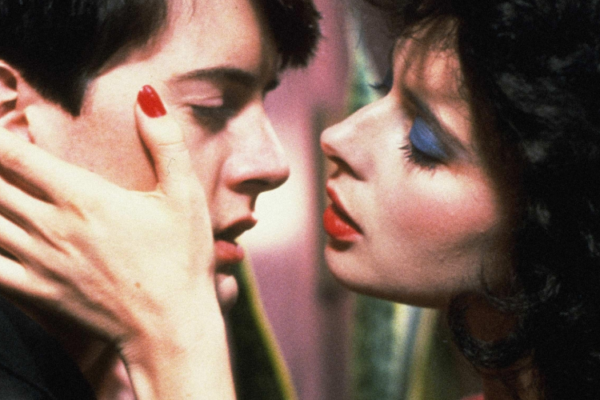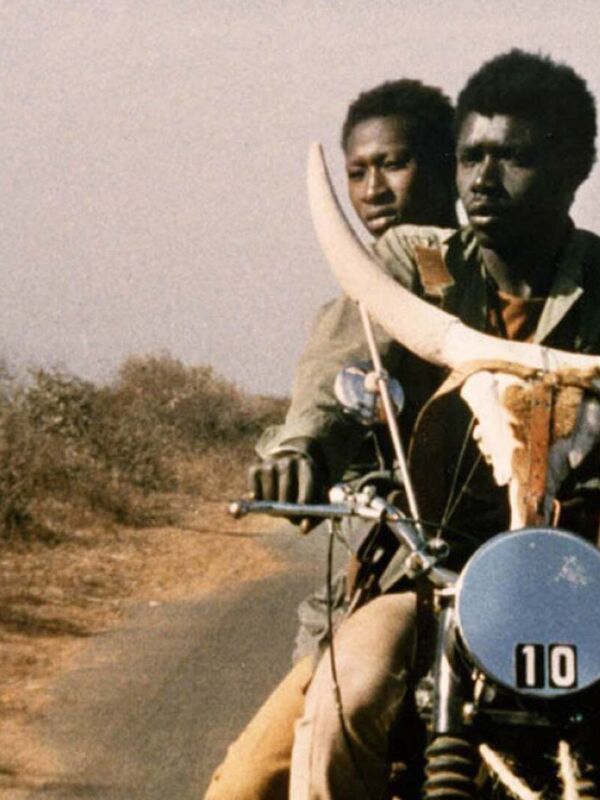Cinema RITCS April
- CINEMA RITCS


NL: In het Senegal van de jaren zeventig had filmmaker Djibril Diop Mambéty meer opties dan ooit. De onafhankelijkheid was in 1960 uitgeroepen, de klauwen van het Franse regime waren minder aanwezig, en de overheid gaf hem geld (omgerekend dertigduizend euro) om een puur Senegalese film te maken. Hij hoefde zich niet te houden aan de verwachtingen van een Europees publiek. Nee, Diop Mambéty kon zich juist ontpoppen tot vaandeldrager van een Nieuwe Afrikaanse Golf.
Voor TOUKI BOUKI (1973) liet Diop Mambéty zich weliswaar inspireren door stijlelementen van de Franse Nieuwe Golf (met name regisseur Jean-Luc Godard), toch bracht hij een uniek West-Afrikaans verhaal tot leven. Met een verrassend, aangenaam snel montage-tempo en een esthetiek vergeven van Senegalese Wolof-cultuur (griots oftewel wijze magische mannen, een motor met een koeienschedel, en een stadscultuur vol volkstradities) vertelt de film de saga van Mory en Anta, charismatische jongeren die op avontuur gaan om genoeg geld te verdienen voor een overtocht naar Frankrijk, in hun ogen het beloofde land.
De hybriditeit van de Senegalese cultuur in de jaren zeventig - gevangen tussen eeuwenoude traditie, een moderniteit die onlosmakelijk verbonden was met de gehate kolonisator Frankrijk, en een collectieve droom van de jeugd om meer te verdienen en een beter leven te hebben dan hun ouders - komt prachtig in beeld door een mengeling van technieken en invloeden. Geen enkele andere film uit deze tijd drukt zo goed uit hoe West-Afrikaanse filmmakers zich losrukten van het Europese juk en zich inzetten voor een Afrikaanse cinema. Touki Bouki (een taalgrap: het is Wolof voor ‘tocht van de hyena’) wordt daarom gezien als een belangrijk cinematisch werk en is ook in 2022 een enigmatische en visueel verrassende kijkervaring.
Cinéclub RITCS
95’
OVEN
EN: In 1970s Senegal, director Djibril Diop Mambéty found himself with unbridled creative freedom: the country was newly independent, the French colonial regime was retreating, and the government offered him the equivalent of 30.000 euros to make a “pure Senegalese movie.” There was no European audience to keep in mind this time; Diop Mambéty was given free reign to establish himself as the godfather of the New African Wave.
For TOUKI BOUKI (1973), Diop Mambéty admittedly was inspired by style elements of the French New Wave (especially Jean-Luc Godard), but still brought a uniquely West-African story to life. With surprisingly fast cuts and an aesthetic heavily influenced by Senegalese Wolof-culture – the “griots” or magical wise men, a motorcycle with a cow skull, a city culture chokfull of folk traditions – the film depicts the saga of Mory and Anta, charismatic young adventurers setting out to make some dough and pay for passage to France, the “promised land” in their eyes.
The hybridity of Senegalese culture in the ‘70s - caught between ancient tradition, a modernity unmistakably connected to the hated colonizer France, and a collective dream of the youth to earn more and surpass their parents’ quality of life – is depicted beautifully through a mixture of techniques and influences. No other film of this time so clearly shows the ways West-African directors fought to break free of the European cultural paradigms. Touki Bouki (a pun on a Wolof phrase, essentially translating to “the hyena’s path”) is therefore an essential cinematic work and an enigmatic and visually arresting experience.
Cinéclub RITCS
95’
OVEN
